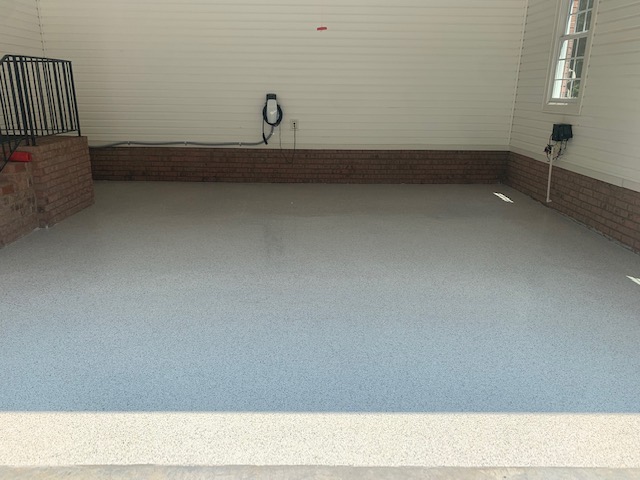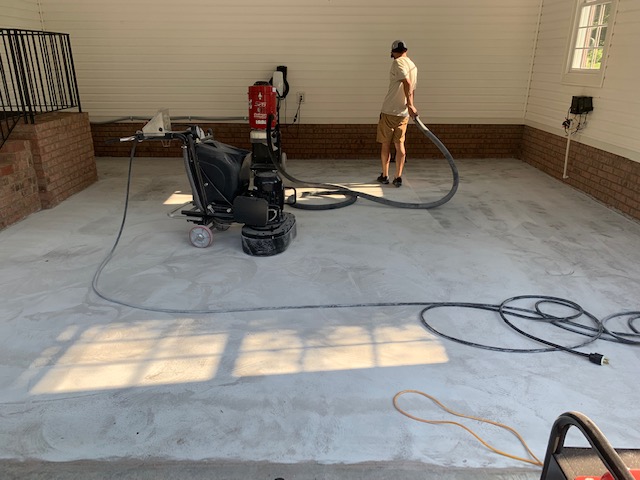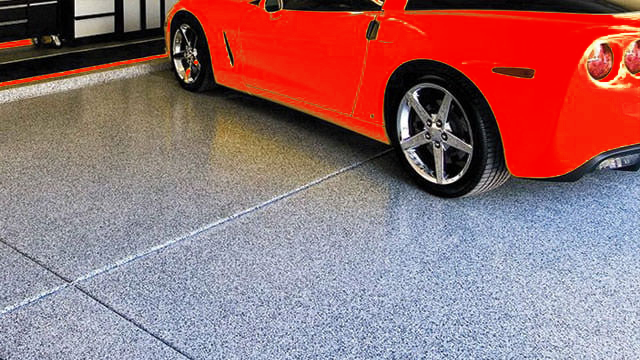If you’re considering installing epoxy flooring in your garage, one of the burning questions on your mind is likely, “How long does garage epoxy take to install?”
Epoxy flooring is a popular choice for homeowners looking to enhance the durability and aesthetics of their garage floors. In this article, we’ll delve into the installation timeline, the factors affecting it, and how regional differences can come into play. Plus, we’ll provide some insights to speed up the installation process.
If you’re in the Charlotte, Matthews, Fort Mill, Pineville, Lake Norman, Davidson, Huntersville, Concord, or Cornelius areas and seeking expert assistance, we’re here to help. But first, let’s explore the world of garage epoxy flooring.
Understanding Epoxy Flooring
Epoxy flooring is a robust and versatile flooring solution known for its durability and attractive finish. It’s a blend of resin and hardening agents that, when applied to concrete floors, create a seamless and glossy surface. Epoxy flooring not only transforms the aesthetics of your garage but also adds a protective layer that resists stains, chemicals, and wear and tear. This makes it an excellent choice for homeowners seeking a long-lasting, low-maintenance garage floor.
Factors Affecting Installation Time
The time it takes to install epoxy flooring in your garage can vary based on several factors:
- Garage Size:
The larger the garage, the more time it takes to apply epoxy. Surface area matters when determining installation time.
- Surface Preparation:
Proper surface preparation is essential. If your garage floor requires extensive repairs or leveling, it will add to the installation time.
- Number of Coats:
The number of epoxy coats can influence the timeline. Typically, two coats are applied, with curing time between them.
- Curing Time:
Epoxy requires time to cure and harden. This can take anywhere from 12 to 72 hours, depending on the specific product and conditions.
Speeding Up the Installation
While the timeline mentioned is typical, you can take steps to expedite the installation process:
- Clear the Space:
Ensure your garage is empty and ready for the installation team.
- Choose a Professional:
Hiring experienced professionals will not only ensure a faster installation but also a high-quality finish.
- Select Quick-Curing Products:
Some epoxy products offer faster curing times.
- Prepare the Surface:
Before installation, make sure your garage floor is in good condition, minimizing the need for extensive repairs.

Regional Considerations
If you’re located in Charlotte, Matthews, Fort Mill, Pineville, Lake Norman, Davidson, Huntersville, Concord, or Cornelius, you may wonder how regional differences can affect the installation timeline of epoxy flooring.
These regional considerations play a crucial role in determining the time it takes to complete your epoxy flooring project. Here are the key factors to keep in mind:
- Climate:
The local climate in your area can impact the installation process. In areas with extreme temperature variations or high humidity, the curing time of epoxy may vary. Epoxy may take longer to cure in colder climates and shorter in warmer ones. Local installers who understand these climate nuances can adapt their processes accordingly.
- Local Regulations:
Different regions may have specific regulations and permitting requirements for flooring installations. Some areas might require additional steps or inspections, which can add time to the installation process. Working with local experts ensures compliance with these regulations, preventing unnecessary delays.
- Availability of Experienced Installers:
The availability of skilled and experienced epoxy flooring installers can vary from one region to another. In areas with a higher demand for epoxy flooring, you may find more experienced professionals who can complete the job efficiently. In contrast, areas with fewer epoxy flooring specialists might have longer lead times for scheduling installations.
In light of these regional considerations, it’s essential to work with local experts who understand the specific conditions in your area. These professionals are well-versed in local regulations, climate nuances, and have a network of resources to ensure a smoother and more efficient epoxy flooring installation.
By partnering with experts familiar with your region, you can minimize potential delays and ensure that your epoxy flooring project is completed in a timely and hassle-free manner.
Conclusion
Installing epoxy flooring in your garage is a smart investment that enhances both the aesthetics and functionality of your space. While the installation process can take a few days, the result is a beautiful and durable garage floor.
If you’re in the Charlotte, Matthews, Fort Mill, Pineville, Lake Norman, Davidson, Huntersville, Concord, or Cornelius areas and need assistance with your epoxy flooring needs, we’re here to help. At Dogwood, we specialize in Garage Epoxy Flooring, Epoxy Patios, Commercial Epoxy Floors, Showroom Floors, and Epoxy Porch Coatings. We’re committed to providing top-notch services to transform your garage into a functional and attractive space. If you’re looking for expert assistance, don’t hesitate to reach out.
That concludes our exploration of the time it takes to install epoxy flooring in your garage. We hope this information has been helpful in your decision-making process. If you have further questions or require our services, feel free to contact us. Your dream garage with stunning epoxy flooring is just a step away.
FAQs
1. Can epoxy garage floors crack?
Yes, epoxy garage floors can potentially develop cracks, especially if they are subjected to certain conditions or if the installation process is not carried out properly. Some common reasons for epoxy floor cracks include:
Substrate Issues: Cracks in the underlying concrete slab can eventually transfer to the epoxy surface. Properly preparing and repairing the concrete is essential to prevent this.
Thermal Expansion and Contraction: Epoxy can expand and contract with temperature fluctuations. In areas with extreme temperature variations, this movement may lead to the development of fine cracks.
Impact or Heavy Loads: Dropping heavy objects or dragging sharp or heavy items across the epoxy surface can lead to chipping and cracking.
Poor Installation: Incorrect surface preparation or improper mixing and application of the epoxy coating can result in a weakened bond, leading to cracks.
To minimize the risk of cracks, it’s crucial to ensure that the concrete substrate is in good condition and that the epoxy is installed correctly, following manufacturer recommendations and guidelines.
2. What is the downside of epoxy garage floors?
While epoxy garage floors offer many benefits, they also have some potential downsides to consider:
Cost: Epoxy floor coatings, especially high-quality ones, can be relatively expensive, particularly when compared to basic concrete floor finishes.
Application Difficulty: Installing epoxy can be challenging for the average DIYer. It requires proper surface preparation, skill in applying the epoxy, and a controlled environment to ensure a successful application.
Limited Reparability: If the epoxy coating is damaged or if it starts to peel or crack, repairing it can be challenging and may require recoating the entire surface.
Slipperiness When Wet: Epoxy floors can become slippery when wet, which may pose safety concerns, especially in a garage where water, snow, or other liquids can be present.
Surface Preparation: Proper surface preparation is crucial, and if not done correctly, it can result in a failed epoxy application.
Despite these potential downsides, epoxy garage floors remain a popular choice due to their durability, appearance, and ease of maintenance.
3. How hard is it to install an epoxy garage floor?
Installing an epoxy garage floor can be a moderately challenging DIY project, and the level of difficulty can vary depending on your experience with similar projects and your attention to detail. Here are some key considerations for installation:
Surface Preparation: Properly preparing the concrete surface is critical. This involves cleaning, repairing any cracks or imperfections, and profiling the surface to ensure good adhesion.
Mixing and Application: Epoxy coatings have specific mixing and application instructions that must be followed precisely. Failure to mix and apply the epoxy correctly can result in a failed installation.
Timing: Epoxy coatings have limited pot life and curing times. You need to work efficiently and follow the manufacturer’s guidelines for timing.
Ventilation: Adequate ventilation is essential to ensure a safe working environment when working with epoxy coatings.
If you have experience with similar DIY projects and are comfortable following detailed instructions, you can attempt to install an epoxy garage floor. However, many homeowners choose to hire professionals for this job, as they have the expertise and tools to ensure a successful and long-lasting installation.

4. Can you epoxy a garage in one day?
While it’s possible to apply an epoxy garage floor coating in a single day, it can be a demanding and time-sensitive project. The key factors that can determine whether you can complete the installation in one day include:
The size of your garage: Smaller garages are more manageable for a one-day installation.
Surface preparation: If your concrete floor is in good condition and requires minimal repair, the preparation phase can be faster.
The specific epoxy product used: Some epoxy coatings have shorter pot life and cure times, allowing for quicker application.
It’s essential to carefully plan the installation, have all the necessary tools and materials on hand, and follow the manufacturer’s instructions for the epoxy product you’re using. Working efficiently and maintaining proper ventilation is crucial. For larger garages or if you’re unsure about the process, you may choose to split the installation into multiple days to ensure a successful outcome.
5. How long does an epoxy floor take to install?
The time required to install an epoxy floor can vary depending on several factors, including the size and condition of the surface, the specific epoxy product used, and the expertise of the installer. In general:
For a small residential garage, a professional installer can often complete the job in one to two days.
Larger spaces, commercial installations, or areas with complex surface preparation requirements may take longer, potentially a few days or more.
DIY installations may also take longer, as homeowners typically have less experience and may need more time for each step.
It’s important to follow the manufacturer’s recommendations for the specific epoxy product you are using and to allow for proper curing and drying times between coats if multiple coats are required. Proper planning and preparation can help ensure a successful and timely installation.

